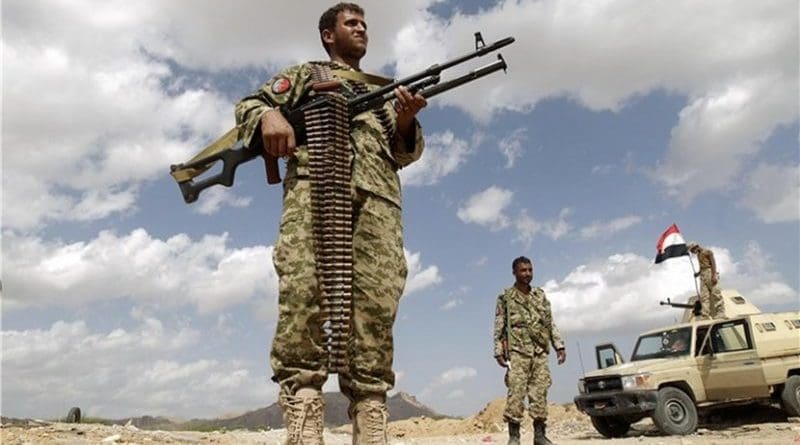Houthi Purge A Reflection Of Group’s True Nature – OpEd
By Arab News
By Peter Welby*
Sheikh Ahmed Salem Al-Sakani, Sheikh Sultan Al-Warwari, Sheikh Khaled Ali Jumaan, and Sheikh Mujahed Qushairah — four individuals of whom most readers of this newspaper will never have heard. Four individuals who, as tribal leaders in Amran Governorate, were central to the Houthi advance in north Yemen in 2014. And four individuals who were killed last week by the same Houthis they helped.
Their murders bring to mind the Russian fable of the scorpion and the frog. A scorpion needs to cross a stream and asks a reluctant frog to carry her on his back. The frog is concerned that the scorpion will kill him, but the scorpion protests that this would doom them both, and the frog agrees. As they get to the other side of the stream, the scorpion stings the frog. The dying frog wants to know why. “I can’t help it,” says the scorpion. “It’s in my nature.”
Incredible as it may seem, many individuals — in Yemen and abroad — delude themselves about the Houthis’ nature. Let’s look at some of their betrayals. They participated in the National Dialogue Conference but, when they didn’t get what they wanted, they decided that the whole country must suffer. They agreed a deal with the government but, when it didn’t work out, they launched a coup. They joined with Ali Abdullah Saleh but, when he had served his purpose, they assassinated him. They agreed a cease-fire and withdrawal from Hodeidah, and then stonewalled until their militias could be replaced by others equally loyal. They agreed a non-aggression pact with tribes in Hajjah province, and then invaded without warning.
Such delusion falls into two camps: The ignorant supporters of the supposedly oppressed; and the willful support of evil in defense of an imagined greater good. The latter have a similar mindset (and are in many cases the very same people) who used to defend the Soviet Bloc for its crimes on the basis that they were committed in defense against the imperial hegemonic West. They treat the former group as “useful idiots” — people whose support can be counted upon without too many questions being asked.
The Houthis’ supporters claim they are fighting oppression and corruption. And yet the evidence of Houthi oppression and corruption grows daily. Those who resist them — whether journalists, academics, political activists or individuals protesting the lack of public services — are routinely imprisoned, tortured and murdered, often without even the pretense of a trial. And their corruption, which their opponents have been speaking of since the start of the war, has finally reached international consciousness as aid agencies, including the UN’s World Food Programme, have finally made public complaints about the diversion of aid and exacerbation of famine by Houthi officials.
Alternatively, the Houthis’ supporters claim that they are fighting Saudi aggression. It is remarkable that such a narrative could have gained credence, when the Houthis’ first assault in 2015 was toward the south and before the Saudi intervention.
All these inconsistencies are forgiven by their informed supporters because of their goals. They are anti-Western (“Death to America”), supporters of and supported by Iran, and deliberately modeling themselves on Hezbollah. This is the background to the latest spate of violence against their own allies (and internecine violence against fellow Houthis), which has seen them reportedly kill dozens of tribal leaders since April.
At the heart of the issue is the Houthi leadership’s creation of an internal security force, Al-Amn Al-Waqa’i, modeled on Hezbollah’s internal security wing. Central governments in Yemen have always had to balance the demands of a central administration with the country’s historic tribal autonomy, and the Houthis’ efforts at governance are no exception. This new force was an effort to impose the will of the Houthi high command on the tribes, but the tribal leaderships, defending their established privileges, resisted.
The Houthi response to dissent is well established. Good faith negotiation is not in their toolkit; they know only the language of force. Tribal leaders who oppose the policies of the leadership must be killed — and not only assassinated, but their bodies mutilated, their families hounded, and their properties destroyed. Once again, the Houthis show their extremist colors; Daesh acts in the same way.
What will it take for the world to see the Houthis’ true nature? How many atrocities must be commissioned at the highest levels of the Houthi leadership for the hand-wringing classes of the West to realize what they are doing? There is a clear distinction between atrocities and tragedies in warfare that take place due to poor training or weak command structures, and those that take place due to the explicit orders or tacit acquiescence of the political and military leadership.
The Houthis are not only killing their tribal allies, they are killing their own commanders too. There are multiple examples through history of how purges and paranoia can undermine a military campaign. Let us hope the Houthis weaken themselves, to the benefit of the legitimate Yemeni government. There is a parallel to the “Anbar Awakening” in Iraq in the mid-2000s, when an extremist group’s oppression and assault on the most influential figures among those they hoped to govern led to a general uprising. Those hoping to defeat the Houthis should exploit this latest purge, turning the militants’ nature against them. In a variant on the story of the scorpion and the frog, the scorpion stings the frog midstream, and they both drown.
• Peter Welby is a consultant on religion and global affairs, specializing in the Arab world. Previously, he was the managing editor of a think tank on religious extremism, the Center on Religion & Geopolitics, and worked in public affairs in the Gulf. He is based in London, and has lived in Egypt and Yemen. Twitter: @pdcwelby

